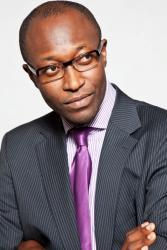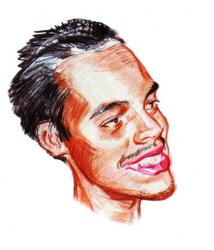Thank You Nelson Rolihlahla Mandela – I will never forget …

06.12.2013 | 0:05 | simon INOU
South Africa’s first black president and anti-apartheid icon Nelson Mandela has died. Mr Mandela, 95, led South Africa’s transition from white-minority rule in the 1990s, after 27 years in prison. I remember being in Cameroon, West Africa when Nelson Mandela was liberated.
On Feb. 11, 1990, Nelson Mandela, icon of resistance to the South-African apartheid regime and later peace Nobel laureate, was released from prison after 27 years. This was a truly moving moment for Africans, so afflicted for so long, and a signal for a new era of peaceful opposition to suppression and war – an unforgettable experience that made a huge impression on me as a young black man from Cameroon.
In my home country Cameroon, we had just gotten used to television in those days 22 years ago, and live-broadcasts were rare. But our eyes were fixed to the screens on that Feb. 11, to the few black and white TVs available. Together with thousands others around the globe, we became witnesses as, after ceaseless pressure from within South Africa and abroad, Mandela was finally set free
The African continent was in political turmoil, as across the continent men and women of all ages and all social stratums joined the rebellion, tired of the degradation and humiliation, fed up with their neo-colonial rulers who walked free with a cynical smile. People had had enough of the violence, which robbed them of their freedom and took away the joy of life.
From Dakar in Senegal to Dar Es-Salam in Tanzania, from South African Cape Town to Algerian Algiers, as in Nairobi in Kenya and Douala in Cameroon – people from all parts of Africa took to the streets to protest. Millions of students, lawyers, NGOs, trade unionists, women, intellectuals, former exiled politicians… They defied the military and political terror, police and corrupt bureaucratic administration, to say “no:” No to dictators and no to lies.
Those were the feelings that African people shared during those days – for us, Feb. 11, 1990, was the most beautiful day of our lives. Finally, Mandela was again among us. The ‘African family’ was complete and ready to face new challenges.
The younger generation of the 1990s clearly remembers Mandela’s haircut. We were impressed with the finely shaved line in the middle of the scull, which quickly became the fashion in Cameroon.
With the name Mandela, we also associated the picture of Winnie, his wife and brave companion, who had carried on his fight against apartheid during his long years in prison, who was feared by the political elite of South-Africa and a symbol of strong African women.
Mandela was without any doubt the personification of a resolute man fighting apartheid; unrelenting in his aims, nevertheless supportive towards his companions at home and abroad. But could he still, after 27 years imprisonment, stand up to the powerful ‘white’ elite, as he had done in his youth?
For us young Africans, Mandela was something like the last surviving Founding Father, the last of a generation of warriors who had dedicated their lives to African independence. He was a tangible manifest focal point of ideas that endured from the violent 1950s until today, that motivated many of the African leaders, of people who by risking their own lives, had inspired the fight for the liberation of Africa.
However, many African leaders, like Amilcar Cabral (1924 – 1973) of Guinea Bissau, Patrice Lumumba of Congo (1925 – 1961) or Ruben Um Nyobe (1913 – 1958) had not survived, and had been assassinated by colonial powers. That Mandela was still alive, and would again be among us, seemed like a miracle. With hiss release, we were able to begin hoping again.
On that memorable Feb. 11, 1990 in our living room, dozens of eyes were glued to the small black & white television screen that suddenly had become the umbilical cord of our world. This TV screen had replaced the radio as prime medium in Africa: We wanted to see Mandela, the symbol of African fight for freedom!
Accompanied by his wife Winnie, he raised his fist as a sign of victory. So much time had passed: His face was covered with wrinkles, the hair white – in Africa a symbol for wisdom. Mandela seemed tired. However, the firm tone of his voice, the decisive words, were the same. We were witnessing Mandela as we remembered him, and we full-heartedly wished to be part of the ecstatic crowd cheering our hero on his way to freedom.
The next day, Mandela spoke at the Town Hall of Cape Town:
“I stand here before you not as a prophet, but as a humble servant of you, the people,” he called out, in ringing tones. “Your tireless and heroic sacrifices have made it possible for me to be here today. I therefore place the remaining years of my life into your hands.”
You went back to the meet the ancestors. Those who come from Nubia, Those who built the giants Pyramids, Those who fought against injustice on the continent. Thank You Nelson Mandela. We will continue your struggle…Like Birago Diop wrote:
Like the senegalese poet Birago Diop wrote:
(…) „The dead are never gone. They are in the shadows. The dead are not in earth. They’re in the rustling tree, the groaning wood, water that runs, water that sleeps, they’re in the hut, in the crowd, the dead are not dead.“ (…)






